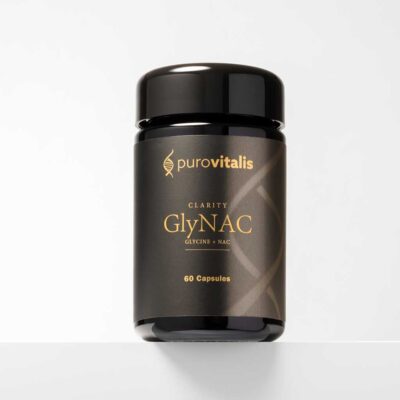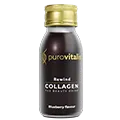
Glycine is a simple but essential amino acid that plays a big role in your body’s overall function. It helps with sleep, brain function, muscle performance, skin health, and digestion. Your body can produce it on its own, but this is not always enough and sometimes levels can drop, which can lead to a range of symptoms.
While glycine deficiency is rare, it can show up in different ways—like sleep problems, muscle weakness, brain fog, or changes in skin and digestion. Knowing the signs can help you spot potential issues early and keep your body balanced. In this blog, we will take a look at what glycine does, glycine side effects to watch out for, why it’s important, and how you will recognise if your levels are too low.
Why getting enough glycine is important
Glycine is involved in so many essential functions that the body prioritizes where it uses the available supply. This means that when glycine levels are low, the body will focus on the most critical processes first, like supporting brain function, neurotransmitter activity, and detoxification. Less important functions, like maintaining skin elasticity, collagen production, or muscle recovery, might be put on hold.
Said with other words; if your glycine intake or production is insufficient, taking collagen supplements may not be as effective for skin, hair, or nails — because the glycine might get redirected to more critical tasks in the body.
Glycine side effects
Glycine is generally considered safe when taken in moderate amounts. However, high doses (more than 15 grams per day) may cause mild digestive issues, such as stomach discomfort or nausea – so these are the main side effects to track. Always start with a lower dose and gradually increase as needed to avoid potential glycine side effects.
What is the right glycine dosage per day?
There are no official recommendations for the daily glycine dosage, as the optimal dose largely depends on why you started supplementing with glycine in the first place.
Glycine dosage for sleep
If you are looking into taking the right glycine dosage for sleep, studies suggest taking a dosage of 3 grams before bed can make a real difference. It’s been shown to enhance sleep quality, shorten the time it takes to fall asleep, and reduce daytime fatigue. This effect likely comes from glycine’s ability to lower core body temperature and increase blood flow to the skin, and the correct glycine dose helps you reach a deeper, more restful sleep.
Glycine dosage for immune support
For those looking to support their immune system, glycine also shows great potential. It strengthens the extracellular matrix, acting as a physical barrier against viruses. Research-based glycine dosage for immune system can give you a ballpark figures. In a three-year study with 127 participants, those who took 10 grams of glycine daily reported fewer and milder viral infections compared to those who didn’t supplement, so consider that a research-based glycine dosage.
Glycine dosage for collagen support
For collagen production, a daily glycine dosage of around 10 grams is recommended. Studies show that increasing glycine intake can significantly boost type II collagen production, helping to support joint health and potentially benefiting those with osteoarthritis. One study found that higher amounts of glycine led to a 60–75% increase in collagen production, while the effects of the other amino acids, proline and lysine, were not as lasting. Researchers concluded that a lack of glycine could be a major reason for poor collagen formation and suggested that getting more glycine through diet might help rebuild cartilage.
Glycine deficiency symptoms
Although glycine deficiency is rare, it’s still helpful to recognize potential glycine deficiency symptoms. Since glycine supports various functions in the body, signs of low levels can vary, including:
Sleep problems
Glycine plays a role in promoting restful sleep by lowering core body temperature and calming the nervous system. A deficiency may lead to difficulty falling asleep, staying asleep, or experiencing restless nights. You might wake up feeling unrefreshed or struggle with daytime fatigue, even after what seems like a full night’s sleep.
Get to know all about how to get a good night sleep here: Sleep for longevity
Muscle weakness
Glycine is important for muscle repair and maintaining muscle strength, as it supports protein synthesis and muscle tissue regeneration. Low glycine levels can result in reduced muscle endurance, slower recovery after exercise, or even a general feeling of weakness and fatigue. This might make daily tasks feel more strenuous than usual, and that’s one of the primary glycine deficiency symptoms.
Related: Human NMN studies reviewed: benefits for muscle and liver health
Brain fog struggles
As a neurotransmitter, glycine supports cognitive function by enhancing communication between nerve cells. A lack of glycine can lead to difficulty concentrating, memory lapses, or a general sense of mental sluggishness. You may feel like your thoughts are clouded or that it takes extra effort to focus on tasks – that might be one of the symptoms of glycine deficiency.
Slower wound healing
As we already know, glycine is essential for collagen synthesis, which plays a key role in skin repair and wound healing. If your glycine levels are low, cuts, bruises, or other minor injuries may take longer to heal. This can be especially noticeable if you’re used to quick recovery from scrapes or minor wounds.
Glycine works well with hyaluronic acid, which also supports wound healing by reducing inflammation and promoting tissue repair. A 2025 study suggests that hyaluronic acid-based hydrogels can speed up recovery. Read more in our blog: Hyaluronic acid – What are the benefits and what is it used for?
Skin changes
Collagen is vital for keeping your skin firm, elastic, and hydrated. When glycine levels are insufficient, your body may struggle to produce enough collagen, leading to sagging or dull-looking skin. Over time, this can make the skin appear aged or less resilient, with fine lines becoming more prominent.
You might also like: Bovine Collagen: types, benefits and safety
Digestive issues
Glycine supports the production of stomach acid and helps maintain the gut lining. A deficiency might cause digestive discomfort, such as bloating, indigestion, or even issues related to leaky gut syndrome. You may notice changes in how your stomach feels after meals or an increase in gut-related symptoms.
How to know if you have glycine deficiency
It can be tricky to know whether glycine deficiency is behind the symptoms you’re experiencing. Even if you have one or more signs, it’s not common for a doctor to specifically test for glycine levels through a blood test. Instead, they’re more likely to take a holistic look at your overall health since these symptoms can have many different causes.
If you suspect that your symptoms might be due to low glycine levels, you can try supplementing with glycine as a practical first step.
At Purovitalis, we recommend our Rewind Liquid Collagen, which not only contains collagen and glycine but is also packed with hyaluronic acid, selenium, anthocyanins, and vitamin C to give your skin, joints, and overall vitality the best possible support.
Related: Glycine food sources
A balanced approach to glycine intake
Glycine might be simple, but it plays a big part in keeping your body working well. Whether it’s helping you get a good night’s sleep, supporting brain function, aiding muscle recovery, or promoting collagen production, glycine does a lot behind the scenes. Even though there’s no universal glycine dosage per day that fits everyone, maintaining healthy glycine levels is important, as it supports many key functions in the body and helps keep you healthy.
While you can get glycine from your diet, it’s not always easy to get enough through food alone—especially if you’re looking to get the most out of its benefits. That’s why taking a supplement can be a practical way to keep your levels steady and support your overall well-being.
References:
- Bannai, M., & Kawai, N. (2012). New Therapeutic Strategy for Amino Acid Medicine: Glycine Improves the Quality of Sleep. Journal of Pharmacological Sciences, 118(2), 145–148. doi:
- Meléndez-Hevia, E., de Paz-Lugo, P., & Sánchez, G. (2021). Glycine can prevent and fight virus invasiveness by reinforcing the extracellular matrix. Journal of Functional Foods, 76, 104318.
- de Paz-Lugo, P., Lupiáñez, J. A., & Meléndez-Hevia, E. (2018). High glycine concentration increases collagen synthesis by articular chondrocytes in vitro: Acute glycine deficiency could be an important cause of osteoarthritis. Amino Acids, 50(10), 1357–1365.
- Huerta-Ángeles, G., & Mixcoha, E. (2025). Recent Advances, Research Trends, and Clinical Relevance of Hyaluronic Acid Applied to Wound Healing and Regeneration. Applied Sciences, 15(2), 536.

GlyNAC – Powerful Cellular Synergy Support glutathione production Fuel cellular energy
Experience the proven synergy of Glycine and N-Acetyl-Cysteïne. Together, they work more effectively than alone to restore glutathione levels, enhance mitochondrial function, and reduce oxidative stress.

Experience the best of Collagen with Purovitalis liquid formula. Try it out!














